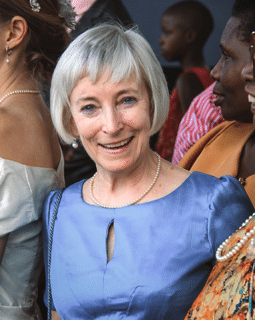
Driven by her Christian faith, Marion Brown is deeply committed to serving the community through St. Paul’s Church and the Diocese of St. Albans as well as other voluntary activities. Her mission centres on empowering individuals to unlock their full potential and find their life’s purpose. She reflects on conflict and division and the power of disagreeing well to bridge divides and create a more harmonious and just world.
As a follower of Jesus Christ, I believe that our inherent worth is deeply rooted in our identity in Christ. This belief has motivated me to dedicate a significant portion of my time to volunteering in local communities. I’ve worked with charities, engaged with students in schools, and discussed various topics with individuals from all walks of life. While my volunteer work often extends beyond a strictly religious context, I firmly believe that fostering self-belief and recognising our innate value is essential for everyone. My own Christian journey has deepened my understanding of identity in Christ, inspiring me to explore ways to empower others to discover their full potential.
Surrounded by conflict
Conflict and division surround us in our society. Workplace dynamics are a common topic of discussion in our home group, a small gathering where we study the Bible, pray, and support one another. Many people face challenges with their bosses or colleagues, often stemming from differences in personalities or expectations. It can be incredibly difficult to work with someone who doesn’t share your values or approach.
Unfortunately, conflicts also arise within families, leading to breakdowns in relationships and tension. Through my work as a Magistrate, I have been exposed to numerous instances of family disputes, where once-harmonious relationships have deteriorated. In these situations, it’s crucial for the adults involved to find a way to work together for the sake of the family, especially when children are involved. The consequences of unresolved conflict extend beyond the individuals directly involved, affecting those around them.
To navigate conflict, even among Christians, the ability to ‘disagree well’ is crucial. Strongly held beliefs can hinder understanding, and emotions can cloud judgment when personal values feel threatened. While our experiences shape our worldviews, this diversity should be a source of richness, not division. Embracing difference and fostering a culture of understanding is essential to overcoming fear of the unknown.
The ripple effect
This is why the Difference course has been so impactful. It’s not just about personal change; it has a ripple effect on the community. My introduction to Difference came through a fellow home group member who suggested we worked through the course as a group. With the support of our job share husband and wife Vicars, we piloted the course in our home group before rolling it out to the other groups. Additional sessions were also run for other members of our church not in those home groups. We emphasised the importance of weekly commitment to the course and were delighted at the dedication of members and their openness to sharing their experiences.
Participants shared their personal struggles – challenging work situations, strained family relationships – and, through group discussions and prayer, they realised they had the power to be agents of change. During the feedback session, many shared how applying the course’s three habits – Be Curious, Be Present, and Reimagine – had a positive impact. Two individuals even reported breakthroughs at work, successfully engaging in productive conversations with senior colleagues, leading to improved outcomes. The application of the three habits has continued beyond the course with some individuals sharing how they are still finding the principles helpful in challenging situations.
The power to change
Difference taught me that I have the power to change how I respond to difficult situations. One key lesson was the importance of pausing during conversations. Instead of rushing in with my perspective, I now actively listen and show genuine curiosity about others’ views. Difference helped me understand that my experiences shape my viewpoint – so why wouldn’t the same be true for others? This realisation fosters empathy and allows for a broader perspective.
The three habits – Be Curious, Be Present, and Reimagine – are interconnected and essential for effective communication. Being present and curious enhances the quality of conversations, while reimagining opens new possibilities for resolution. Reimagining, especially through the lens of faith, allows for solutions beyond our limited expectations, inviting God’s guidance in unexpected ways.
This concept of reimagining is central to my hope for the world. It reminds me that individuals, no matter their position or influence, can effect significant change. We often feel powerless in the face of global challenges, but focusing on our own spheres of influence can generate positive ripple effects. A powerful example was the peaceful protests that followed recent riots. Community leaders and individuals of faith rose to promote peace, unity, and understanding, demonstrating the transformative power of collective action.
Looking to the future
As for the future of Difference in our church, we plan to offer refresher courses and expand the programme to new groups. We’re also considering incorporating it into our youth ministry programme. I’ve recommended Difference to others beyond our church, as I believe it’s a valuable tool for fostering positive change. Personal growth requires intentional practice, and the Difference habits are no exception. By consciously applying these principles, we can become more aware of our biases and improve our listening and communication skills. My goal is to continue developing these skills, aiming to become a more Christ-like person, and embodying the principles of Difference to contribute to a more harmonious and just world.

Marion Brown is a Magistrate and an active member of St Paul’s Church, St Albans. She is involved with a number of voluntary activities with individuals and local organisations, with a particular emphasis on developing people, and initiatives that strengthen community links.



